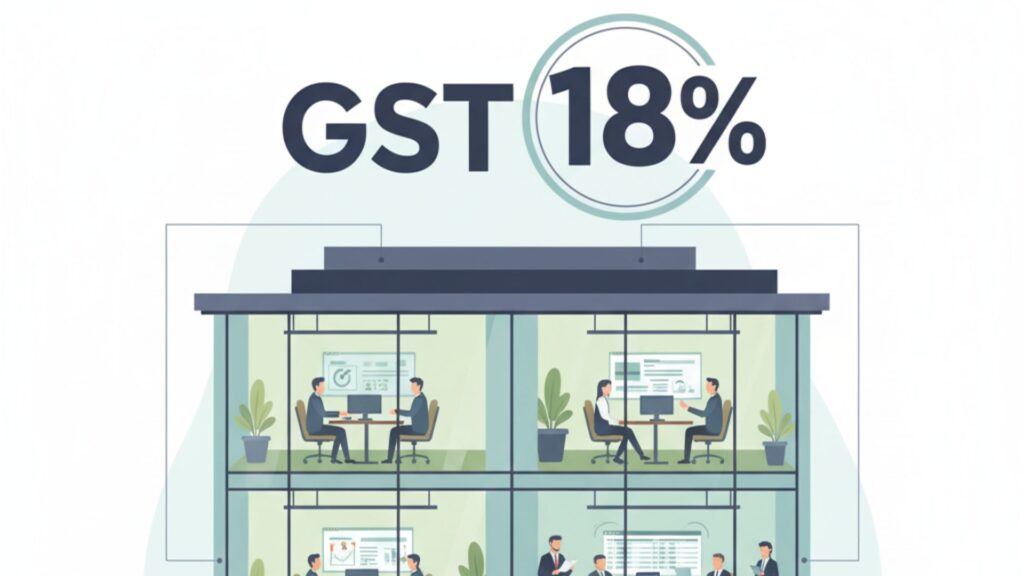Walk through any metro city in India and you will notice cranes in the skyline, new office towers coming up, and shopping malls filling with tenants. Behind this visible growth, another important story is shaping the economy. It is the story of India’s Goods and Services Tax (GST) collections. These numbers reflect much more than government revenue. They give a sense of how businesses are formalizing, how consumption is holding steady, and how commercial real estate is adapting to the new tax landscape.
By 2025, GST is no longer just a tax policy. GST Trends has become a reliable pulse check on the Indian economy. Nowhere is its influence felt more directly than in commercial leasing.

Table of Contents
The Big Picture: GST Collections on the Rise
India’s GST collections have shown steady growth over the last few years, even when global markets presented challenges. In August 2025, the government collected ₹1.86 lakh crore, which was a 6.5 percent increase compared to the same month in the previous year.
For the financial year 2024–25, average monthly collections stood at ₹1.84 lakh crore. This was higher than the ₹1.68 lakh crore average recorded in 2023–24. In April 2025, the government achieved a record collection of ₹2.37 lakh crore. This is the highest monthly collection since GST was first introduced in 2017.
Commercial real estate has been one of the important contributors to this growth. States such as Maharashtra and Karnataka, with their busy IT parks, corporate hubs, and retail centers, continue to generate a significant share of GST revenue. Their strong leasing markets and infrastructure projects support both direct collections and broader economic activity.
Leasing and the GST Puzzle
The GST Council held its 56th meeting in September 2025. The decisions made there confirmed that the GST rate on commercial leasing remains at 18 percent. This clarity has ensured that there are no sudden shifts in tax obligations for landlords, developers, or tenants.
While the 18 percent rate is often debated, the absence of new changes has given stakeholders some breathing space. Developers, landlords, and tenants can now plan their leasing arrangements with better predictability.
Investor Sentiment for Commercial Real Estate in 2025

Investors value stability. In 2025, the commercial real estate market benefits from GST rules that remain consistent. The continuation of the 18 percent rate on leasing has helped reduce uncertainty in contracts and return expectations.
Developers are still careful when starting new projects. Instead of speculative office or mall constructions, they prefer projects where anchor tenants are secured in advance. Investors are also showing interest in mixed-use spaces that reduce risk by balancing offices, retail, and other components.
For occupiers, the stability of GST rules has brought predictability to rental agreements. While the tax rate adds to total occupancy costs, at least there are no sudden policy shocks that could disrupt business plans.
Compliance Realities
GST in real estate is not just about collections. It is equally about compliance. By 2025, some key rules continue to shape how landlords and tenants operate:
- Registration threshold: Any landlord with annual rental income exceeding ₹20 lakh must register under GST. In special category states, the limit is ₹10 lakh.
- Invoicing: GST-compliant invoices are mandatory for all registered landlords. These invoices help tenants maintain proper records and the government to track transactions.
- Return filings: Landlords must file regular returns. Failure to do so can lead to penalties and disputes.
These compliance requirements may feel complex, but they bring greater credibility to the sector. Tenants receive proof that their rent payments are accounted for correctly, and the government gains a transparent view of leasing activity.
Transparency vs Cost Burden
The 18 percent GST rate on commercial leasing is a point of debate across the sector. Landlords often argue that it increases their costs. Tenants highlight that it raises the overall cost of renting office and retail spaces. Policymakers respond by emphasizing that GST has pushed more transactions into the formal system.
All three perspectives are valid. For landlords, margins become tighter. For tenants, leasing premium spaces becomes more expensive. For the system as a whole, however, transparency improves and leakages are reduced.
By mid-2025, India’s GST network had grown to more than 1.51 crore registered taxpayers. This growth reflects how deeply businesses, including real estate, are becoming part of the formal economy.
Key Takeaways for Stakeholders

Looking at the numbers and compliance structure, here are some important lessons for the commercial real estate sector in 2025:
- GST collections remain strong, highlighting resilience in the broader economy.
- The 18 percent GST rate on leasing continues, giving stakeholders clarity for planning.
- Compliance requirements such as registration, invoicing, and return filings remain non-negotiable.
- Policy stability allows developers and investors to focus on sustainable growth rather than short-term adjustments.
The Road Ahead
The next phase for commercial real estate in India will be defined by measured growth. Developers are expected to prefer projects where tenants are confirmed early. Investors are likely to examine yields more carefully on a city-by-city basis. Tenants, especially large corporates, may lock in longer leases to manage costs in a predictable way.
GST has become more than a revenue collection tool. It is now a structural factor that shapes how commercial property deals are negotiated, financed, and executed.
Conclusion
The GST story of 2025 has two sides. On one hand, rising collections show that India’s economy is steady and that formalization is deepening. On the other hand, the 18 percent GST rate on commercial leasing continues to put cost pressure on both landlords and tenants.
Yet, the benefit of stable rules and transparent compliance cannot be overlooked. For developers, landlords, investors, and tenants, the focus now is on balancing compliance with smart financial strategies. If approached carefully, India’s commercial real estate sector can continue to grow within a tighter but more reliable GST framework.
Frequently Asked Questions
Q. What is the GST rate on commercial property leasing?
Leasing of commercial properties attracts an 18% GST. This applies to office spaces, retail shops, malls, and other commercial establishments. The rate is consistent under GST 2.0, providing stability for landlords, developers, and tenants.
Q. Do landlords need to register for GST?
Yes. Any landlord earning aggregate rental income above ₹20 lakh annually (₹10 lakh in special category states) must register for GST. Registration ensures compliance with invoicing and return filing requirements.
Q. Is GST applicable to the sale of completed residential flats?
No. If the sale of a residential unit occurs after the issuance of the completion certificate or first occupation, GST is not applicable. Only under-construction properties attract GST at applicable rates (1% for affordable units, 5% for other residential units).
Q. Are rentals from commercial properties subject to GST for tenants?
Yes. Tenants leasing commercial spaces pay rent inclusive of 18% GST. The tax is part of the rental agreement and is collected by the landlord, who remits it to the government.